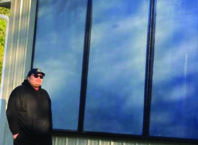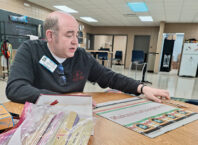By Lee Egerstrom
Robert (Bob) Blake, founder of the Solar Bear solar installation company based jointly in Minneapolis and at Red Lake, is taking his advocacy for renewable energy, climate change remediation, social and economic justice, and educating and training to fellow travelers and tribal groups all across Indian County.
“Time is running out,” he said at a recent interview at the Pow Wow Grounds in Minneapolis. “Mother Earth is calling us. We all have to answer the call, and especially we Native People.”
Blake, who calls himself a Red Lake Ogichidaag (“warrior” in Ojibwe) for green energy development, is at once an entrepreneur and at the same time a nonstop advocate and warrior for change. He has more programs and business activities in motion right now than most people try in a lifetime.
His life is about to become more complicated. Blake, 45, will start a two-year Executive MBA (Master of Business Administration) program at the University of Minnesota Carlson School. It is geared towards people who have been out in the workplace, often in mid-career positions.
At the same time, Blake is working with consulting groups to transition his Solar Bear installation company into a worker-owned cooperative. This will require finding people in the young green energy industries who want to be both owners and workers as the solar industry expands across the nation, he said. Making workers also owners is the most equitable way to share profits and let worker gain real rewards for their work, not just profiting corporate owners, he said.
Solar Bear started three years ago. Blake collaborated with Ralph Jacobson and his IPS Solar company based in Roseville, and with Red Lake Nation on the first phase of Red Lake’s solar power initiative. Jacobson and IPS Solar arranged financing, among other services, and Solar Bear did the initial installation work in 2018.
In his 2019 State of the Band address, Red Lake chairman Darrell Seki Sr. reported on the first phase, of three planned stages, that included installation of a 70-kilowatt solar system at the government building.
As reported in the Red Lake Nation News, Seki said: “The installation on the roof of the government center provided the perfect opportunity for tribal member Robert Blake to begin operation of Solar Bear, his solar installation company. Solar Bear hired tribal members to install the system, and for most, it was their first on the job training experience of working with solar.”
Blake considers Jacobson – a recognized national leader in solar development – to be an important mentor to him and Solar Bear. That is a role he aspires to take on for others.
Red Lake seeks to make the entire reservation carbon neutral for the future. Blake said he would like Red Lake to become a model for tribal groups all across the country.
He is working with others in planning a national conference Aug. 31 – Sept. 4 in St. Paul. That group, the Institute for Tribal Environmental Professionals (ITEP), will hold the first of what it intends to be biennial National Tribal & Indigenous Climate Conferences.
Blake is also putting in place entities to help develop programs to carry on green development and solar contributions to climate, people’s health and economic opportunities.
He recently incorporated Native Sun, a community power development firm, as a Minnesota-based nonprofit (501c3) organization. This, he said, will allow Native Sun to handle grant money, work with other groups, and let it help in fundraising for tribal groups that want to develop solar or related workforce training and education programs
That dovetails nicely with his work as a Just Solar organizer for the Minnesota Interfaith Power & Light nonprofit in Minneapolis. Just Solar Returning Citizens Initiative is a collaboration between the faith group and the Minnesota Department of Corrections.
It trains previously incarcerated citizens in solar installation and site evaluation, and they receive certification on their training with photovoltaic cells.
One such training site is at Willow River Correctional Facility in northern Minnesota.
It is an effort to fight recidivism among “marginalized people, who often don’t have jobs waiting for them when they return to society,” Blake said. “This affects too many Native Americans.”
Blake is also instrumental in a youth educational endeavor that is an outgrowth of Solar Bear and is now aided by Native Sun. It is the Solar Cub program operated with the Science Museum of Minnesota that works with children at the museum in St. Paul and with educators in the Red Lake school system. It is a K-12 program teaching children about gardening, recycling, energy efficiency and renewable energy.
“The kids are going to have to be prepared for the climate crisis and we don’t want them to feel like they don’t have the tools to deal with it,” he said. For Red Lake young people, he said, “the ‘bears’ will teach the ‘cubs’ and empower them to take the climate crisis head-on while also teaching them the Ojibwe language.”
Solar Cub at Red Lake works with the Ojibwe immersion program in the schools. Blake said this program is especially fitting this year. The theme for this Earth Day (April 22) is climate action. It is the 50th anniversary of the start of Earth Day that is now acknowledged by 197 countries around the globe.
Greta Thunberg, the 17-year-old Swedish environmental activist, has young people energized throughout the world, Blake said. “That is certainly true among young Natives “here on Turtle Island.
“This is the decade when we have to come together on the climate crisis. I firmly believe Native people have a special role to play.
“What would it look like if all the tribes say, ‘Hey, we (sovereign nations) are still in the Paris Agreement!’ That’s my advice to tribal people,” he said, referring to the United Nations agreement to counter climate change.
So far 187 countries have signed the agreement that calls for lowering global temperatures through using less fossil fuels, among other measures. The United States is withdrawing from the agreement this year.
Where does Blake get his passion? From his family, he said. Both parents – enrolled members at Red Lake – were past Army sergeants as well. Father William Blake was a Korean War veteran; mother Charlotte Monette is a Gulf War vet.
A brother, William Blake, was a Minneapolis Policy sergeant. He died in 2009 while waiting a heart transplant.
“That kind of made me a surrogate father for his (five) kids,” Blake said. “I guess that has kept me thinking about young people and how their futures are threatened.”
Blake has other irons in the fire, or at least warming in the sun. He’s a board member on the Governor’s Workforce Development Board, a board member of the National Association of Minority Contractors, a member of the Clean Energy Partnership (CEP) and Energy Vision Advisory Commission (EVAC) for the city of Minneapolis, a board member of the American Indian Family Center in St. Paul, an advisory board member for the Climate Generation: A Will Steger Legacy nonprofit, a member of the Minnesota State Climate Table group for nonprofits and foundations, and is a Green Jobs Pathways advisory committee member for Migizi in Minneapolis.
Blake unsuccessfully sought a St. Paul City Council seat this past year. He did become a committee member for the Institute on the Environment at the University of Minnesota. Its Energy Transition Lab is currently installing three major solar power batteries at locations around Minnesota.
He currently has an associate degree from Minneapolis Community and Technical College, a bachelor’s degree and a master’s degree from Metropolitan State University. The MA is in advocacy and political leadership.







